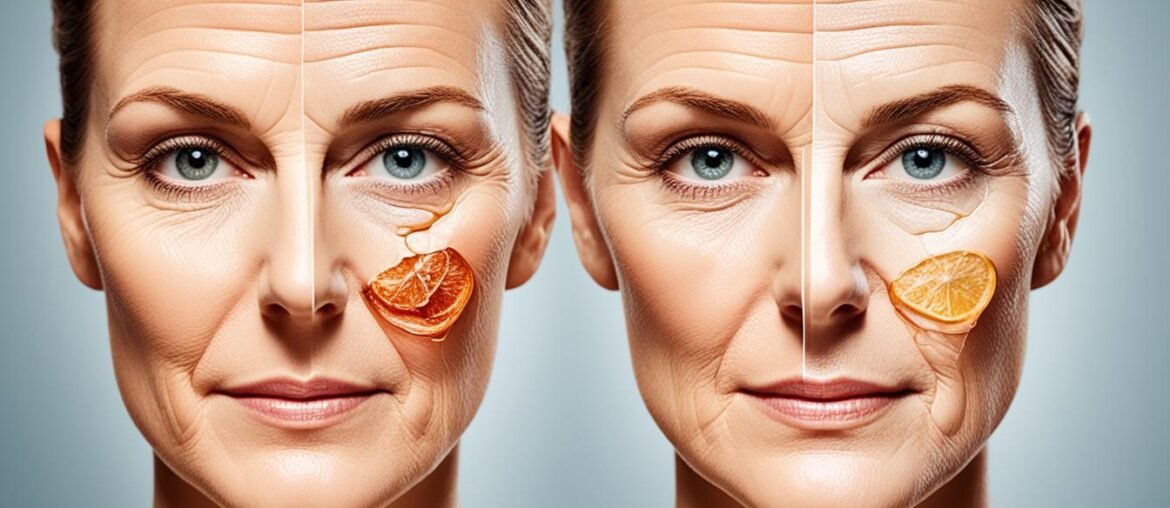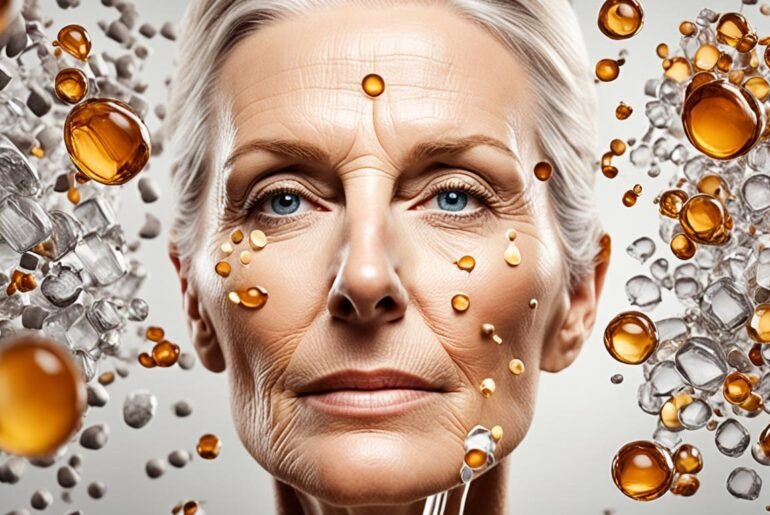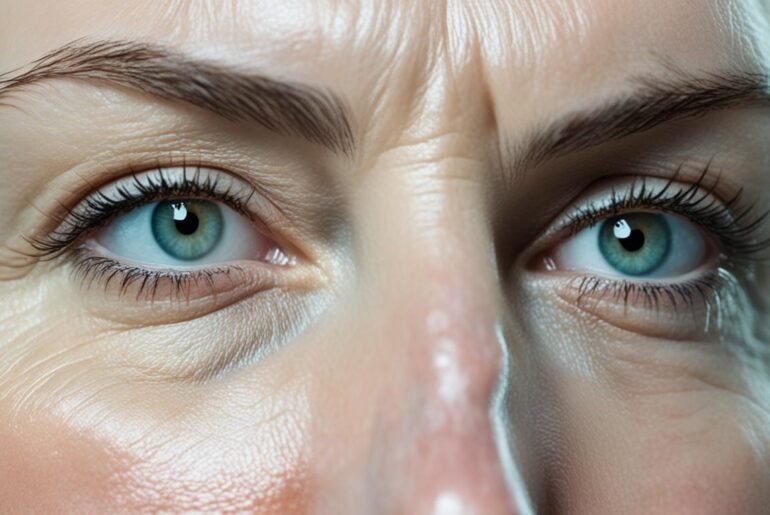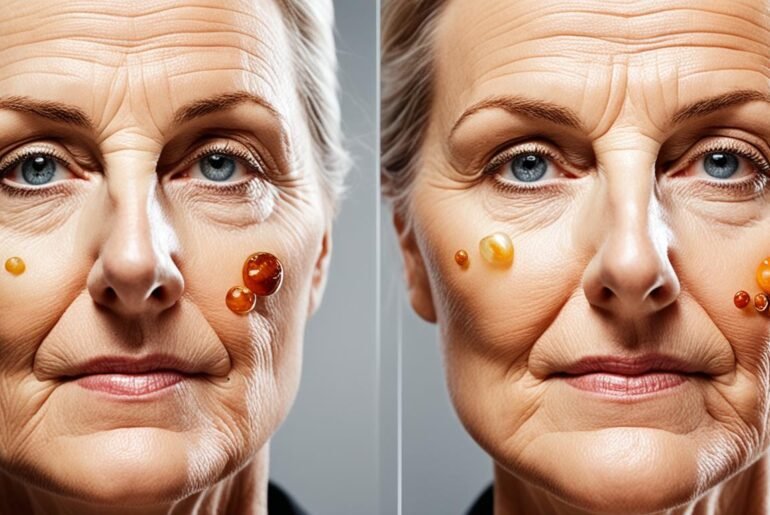Did you know that alcohol consumption can significantly impact the health and appearance of your skin? A study has revealed that both smoking and heavy alcohol use are associated with facial aging, including skin inflammation and the development of fine lines and wrinkles.
Alcohol-induced skin inflammation and aging are not just cosmetic concerns. They can have significant implications for your overall skin health and contribute to the development of various alcohol-related skin conditions.
- Excessive alcohol consumption can lead to skin dehydration, causing visible dryness, wrinkles, and under-eye puffiness.
- Alcohol can disrupt sleep patterns and aggravate underlying skin conditions such as rosacea and eczema.
- Chronic alcohol abuse may result in more severe skin problems, including increased risk of infections, skin cancer, and skin changes related to alcoholic liver disease.
Understanding the effects of alcohol on the skin is crucial for maintaining healthy and youthful-looking skin. In the following sections, we will explore in detail how alcohol affects the skin, the specific skin conditions aggravated by alcohol, and the long-term consequences of alcohol abuse on skin health.
Key Takeaways:
- Alcohol consumption can contribute to skin inflammation and aging.
- Excessive alcohol use can lead to dehydration, wrinkles, and under-eye puffiness.
- Alcohol can aggravate underlying skin conditions like rosacea and eczema.
- Chronic alcohol abuse can result in more severe skin problems and increase the risk of infections, skin cancer, and alcoholic liver disease-related skin changes.
- Understanding the effects of alcohol on the skin is essential for maintaining healthy skin.
The Effects of Alcohol on the Skin
Excessive alcohol consumption can have negative effects on the skin, leading to various skin issues that can impact overall skin health. Alcohol has a dehydrating effect on the skin, causing visible signs of dehydration such as dryness, tightness, and flakiness. This can result in the formation of wrinkles and fine lines, as well as under-eye puffiness and redness.
Furthermore, alcohol consumption can disrupt sleep patterns and interfere with the body’s natural rejuvenation and repair processes, which are essential for maintaining healthy skin. Lack of quality sleep can contribute to a dull complexion and compromised skin barrier function, making the skin more susceptible to damage and inflammation.
In addition to dehydration and sleep disruption, alcohol can aggravate existing skin conditions. Individuals with rosacea may experience increased flushing, redness, and inflammation after consuming alcohol. Eczema sufferers may notice worsened skin symptoms, including itching, redness, and dryness. Alcohol can also trigger flare-ups in individuals with psoriasis, leading to increased skin scaling and inflammation.
| The Effects of Alcohol on the Skin: | ||||
|---|---|---|---|---|
| Dehydration | Visible wrinkles and fine lines | Under-eye puffiness | Redness | Disrupted sleep patterns |
| Aggravation of existing skin conditions: | Rosacea | Eczema | Psoriasis |
Chronic alcohol abuse can have even more severe consequences for skin health. People who excessively consume alcohol are at a higher risk of developing skin infections due to a weakened immune system. The compromised immune function makes it harder for the body to fight off bacteria, viruses, and fungi that can lead to skin infections.
Moreover, long-term alcohol abuse is associated with an increased risk of developing skin cancer. Alcohol can interact with other factors such as ultraviolet (UV) radiation from the sun, leading to a higher susceptibility to skin damage and the development of skin cancer.
In some cases, alcohol-related liver disease can manifest in skin changes. Jaundice, a yellowing of the skin and eyes, can occur when the liver is unable to properly process bilirubin, leading to a buildup in the body. Dry and itchy skin are also common symptoms of liver dysfunction caused by chronic alcohol abuse.
It is important to understand the effects of alcohol on the skin and make informed decisions regarding alcohol consumption for the sake of skin health. Prioritizing hydration, maintaining a healthy lifestyle, and seeking professional help for alcohol-related issues can contribute to better skin health and overall well-being.
- Smith, R. N., Mann, N. J., Braue, A., Mäkeläinen, H., Varigos, G. A., & Varigos, G. (2007). The effect of a high-protein, low glycemic-load diet versus a conventional, high glycemic-load diet on biochemical parameters associated with acne vulgaris: a randomized, investigator-masked, controlled trial. Journal of the American Academy of Dermatology, 57(2), 247-256.
- University of Washington Alcohol and Drug Abuse Institute. (n.d.). Alcohol and Psoriasis: Is It a Trigger? Retrieved from https://adai.uw.edu/pubs/pdf/2008ChampouxWilson.pdf
- Mandekou-Lefaki, I., & Delli, F. S. (2004). Effects of Alcohol on Skin Aging. Current Drug Abuse Reviews, 1(1), 95-102.
Dehydration and Skin Damage
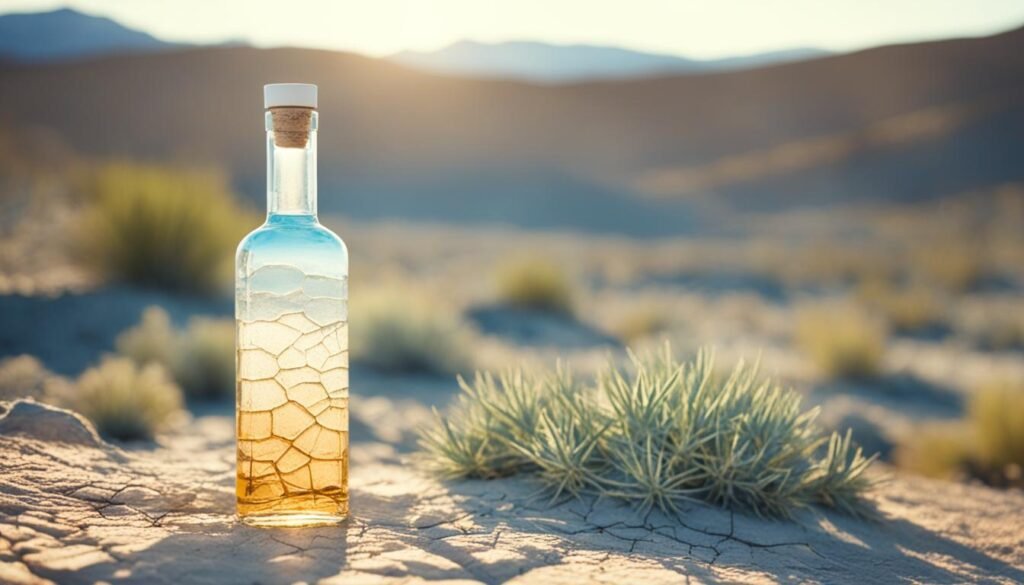
Alcohol, being a diuretic, can cause dehydration in the body, leading to dry and flaky skin. The depletion of water and essential nutrients in the body affects the skin’s hydration levels, resulting in a dull and rough appearance.
Moreover, alcohol reduces oil production by the skin, which is responsible for maintaining moisture levels. This reduction in oil production further contributes to dryness and accelerates skin dehydration.
H3: Impaired Skin Barrier Function
Additionally, alcohol impairs the skin’s natural barrier function. The skin’s barrier acts as a protective shield, keeping harmful substances out and preventing moisture loss. Alcohol disrupts this vital barrier, leaving the skin vulnerable to dryness, redness, and irritation.
Excessive alcohol consumption compromises the skin’s ability to retain moisture, resulting in drier skin and increased sensitivity. Over time, untreated skin dehydration can lead to the development of more severe skin issues, such as dermatitis and eczema.
Dehydration caused by alcohol can make the skin look dull, lacking vitality, and more prone to the early signs of aging.
Staying hydrated is critical in mitigating alcohol’s dehydrating effects on the skin. Drinking plenty of water helps replenish lost fluids and maintain skin moisture levels. Additionally, it is advisable to incorporate hydrating skincare products into the daily skincare routine.
Table: Hydration Tips for Alcohol-Related Skin Dehydration
| Hydration Tips | Benefits |
|---|---|
| Drink at least 8 glasses of water daily | Keeps the body and skin hydrated |
| Use a moisturizer enriched with hydrating ingredients | Restores moisture balance, improving skin hydration |
| Avoid long, hot showers or baths | Prevents further moisture loss and dryness |
| Limit alcohol consumption | Reduces the dehydrating effects on the body and skin |
| Protect the skin from harsh environmental conditions | Maintains skin’s moisture barrier |
By prioritizing hydration and adopting a skincare routine that focuses on restoring and maintaining moisture levels, it is possible to counteract the skin’s dehydration caused by alcohol consumption.
Flushing and Inflammation
Drinking alcohol can have noticeable effects on the skin, including flushing and inflammation. When alcohol is consumed, it stimulates the release of histamines in the body. These histamines cause the blood vessels in the skin to dilate, leading to a flushed appearance. Over time, this inflammation can become more prominent and challenging to reverse, resulting in persistent facial redness.
Excessive alcohol consumption can exacerbate skin flushing and inflammation, leading to long-term damage. It is important to note that individuals may have different levels of sensitivity to alcohol, and some may be more prone to experiencing these effects than others.
“Alcohol-induced flushing can be a result of various factors, including genetic predisposition, individual tolerance levels, and the amount and frequency of alcohol consumed.”
Individuals who frequently consume alcohol may develop a condition called alcohol-induced skin inflammation. This can manifest as redness, swelling, and discomfort in the affected areas. Continued alcohol consumption can further perpetuate this process and make the symptoms more severe.
To illustrate the effects of alcohol-induced flushing and inflammation, consider the following table:
| Alcohol Consumption | Skin Flushing | Skin Inflammation |
|---|---|---|
| Occasional | Mild flushing | No significant inflammation |
| Moderate | Noticeable flushing | Mild inflammation |
| Heavy | Severe flushing | Pronounced inflammation |
This table highlights the relationship between alcohol consumption and the intensity of skin flushing and inflammation. As alcohol consumption increases, so does the likelihood of experiencing more pronounced symptoms. It is essential to recognize these effects and take appropriate measures to maintain skin health.
In the next section, we will explore how alcohol can aggravate existing skin conditions and the potential risks associated with long-term alcohol abuse.
Skin Conditions Aggravated by Alcohol
Alcohol abuse can have detrimental effects on the skin, worsening existing skin conditions such as rosacea, eczema, psoriasis, and seborrheic dermatitis.
Rosacea: Individuals with rosacea often experience flushing and inflammation of the skin. Alcohol-induced flushing can exacerbate these symptoms, leading to further irritation and discomfort.
Eczema: Those with pre-existing liver problems are more susceptible to developing discoid eczema. Alcohol consumption can trigger inflammation and worsen the symptoms of this skin condition.
Psoriasis: Alcohol intake may increase the risk of developing psoriasis and can also make the condition more difficult to manage. This chronic skin condition is characterized by red, scaly patches that can be itchy and painful.
Seborrheic Dermatitis: Excessive alcohol consumption can exacerbate seborrheic dermatitis, a common skin condition that causes inflamed patches with white or yellow flakes, primarily on the scalp and face.
It is important for individuals with these skin conditions to be mindful of their alcohol consumption and take steps to manage their condition effectively.
Treatment and Management
While completely avoiding alcohol may be ideal for individuals with these skin conditions, moderation and informed choices can help minimize the impact. Working closely with a dermatologist or healthcare provider can provide guidance on managing symptoms and identifying triggers. Additionally, adopting a consistent skincare routine tailored to the specific condition can help reduce flare-ups and maintain skin health.
A healthy lifestyle that includes a balanced diet, regular exercise, stress management, and adequate sleep can also contribute to overall skin wellness and minimize the impact of alcohol on existing skin conditions.
Long-Term Effects of Alcohol on the Skin
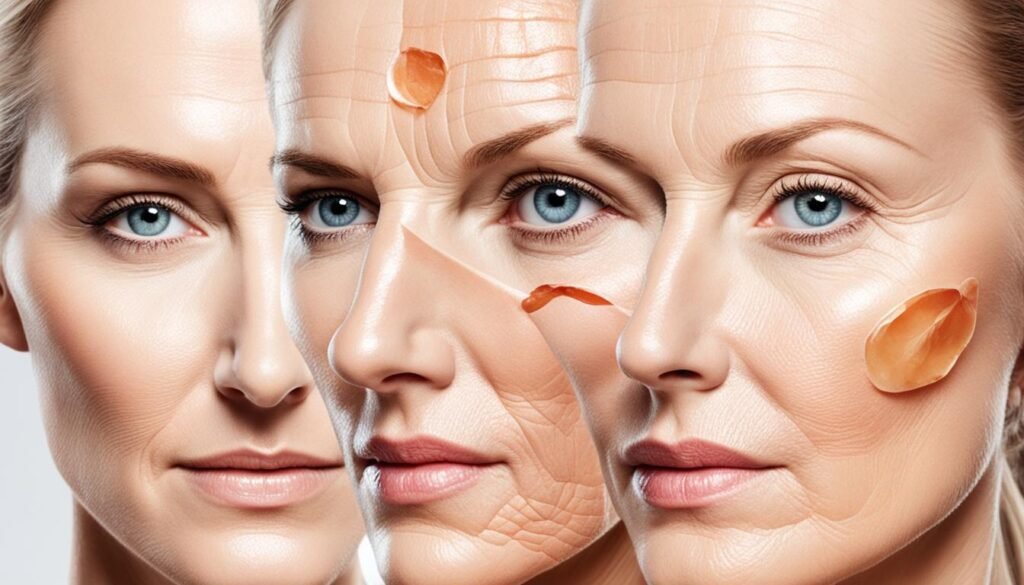
Heavy and chronic alcohol consumption can have significant long-term effects on the skin. Excessive alcohol intake weakens the immune system, making individuals more susceptible to skin infections. It may also increase the risk of developing skin cancer by compromising the immune system and exacerbating the effects of UV light on the skin.
Alcohol abuse can lead to various skin changes related to alcoholic liver disease, such as jaundice, itchy skin, and dry skin. These manifestations are often indicative of liver damage and can be distressing for individuals experiencing them.
Additionally, the long-term effects of alcohol on the skin include premature aging, appearance of wrinkles, fine lines, and sagging skin. Continuous alcohol consumption accelerates the breakdown of collagen and elastin, proteins that maintain the skin’s elasticity and structure. As a result, the skin loses its firmness and resilience, leading to visible signs of aging.
To highlight the potential consequences of long-term alcohol abuse on the skin, consider the following table:
| Effect | Description |
|---|---|
| Susceptibility to Skin Infections | Alcohol weakens the immune system, making individuals more prone to skin infections. |
| Risk of Skin Cancer | Compromised immune system and increased exposure to UV light can heighten the risk of developing skin cancer. |
| Alcoholic Liver Disease | Alcohol-related liver damage can manifest as jaundice, itchy skin, and dryness. |
| Premature Aging | Continuous alcohol consumption accelerates the breakdown of collagen and elastin, leading to wrinkles, fine lines, and sagging skin. |
It is crucial to be aware of the long-term effects of alcohol on the skin and take steps to mitigate the damage. Seeking professional help for alcohol abuse, adopting a skincare routine, and maintaining a healthy lifestyle can contribute to preserving the health and appearance of the skin.
Alcohol-Induced Dry Skin
Alcohol consumption can have a significant impact on the hydration levels of your skin. When you consume alcohol, it acts as a diuretic, causing the body to lose water through increased urination. This dehydration can directly affect the skin, leading to dryness, flakiness, and a lack of moisture.
Additionally, alcohol can interfere with the skin’s natural moisture barrier. This barrier helps to retain moisture and protect the skin from external elements. When alcohol impairs this barrier, the skin becomes more susceptible to dryness, redness, irritation, and other related skin complications.
To counteract the effects of alcohol-induced dry skin, it is essential to take proactive measures. Staying hydrated by drinking plenty of water can help replenish lost moisture in the body and support skin health. Incorporating a moisturizer into your skincare routine is vital to keep your skin hydrated and supple.
Avoiding harsh skincare products that can further dry out your skin is also crucial. Look for gentle, hydrating cleansers and moisturizers that provide essential nutrients and lock in moisture.
Caring for Dry Skin – Tips and Recommendations
- Use a mild, hydrating cleanser: Opt for a gentle cleanser that won’t strip your skin of its natural oils. Look for ingredients like hyaluronic acid, glycerin, and ceramides that help retain moisture.
- Moisturize regularly: Apply a moisturizer to your skin twice a day, focusing on areas prone to dryness. Look for products that contain ingredients like shea butter, jojoba oil, or aloe vera to replenish and lock in moisture.
- Avoid hot showers and baths: Hot water can strip away the skin’s natural oils, leading to dryness. Opt for lukewarm water instead and limit your shower or bath time.
- Protect your skin from harsh weather conditions: Extreme cold or hot weather can further dehydrate your skin. Use protective clothing, hats, and sunscreen to shield your skin from environmental factors.
- Consider using a humidifier: Adding moisture to the air in your home can help combat dry skin. A humidifier can increase humidity levels, especially during the winter months when the air tends to be drier.
Taking care of your skin and ensuring it stays hydrated is essential for maintaining its overall health and appearance. By being mindful of your alcohol consumption and adopting a proper skincare routine, you can mitigate the effects of alcohol-induced dry skin and promote a healthier complexion.
Effects of Alcohol on the Face
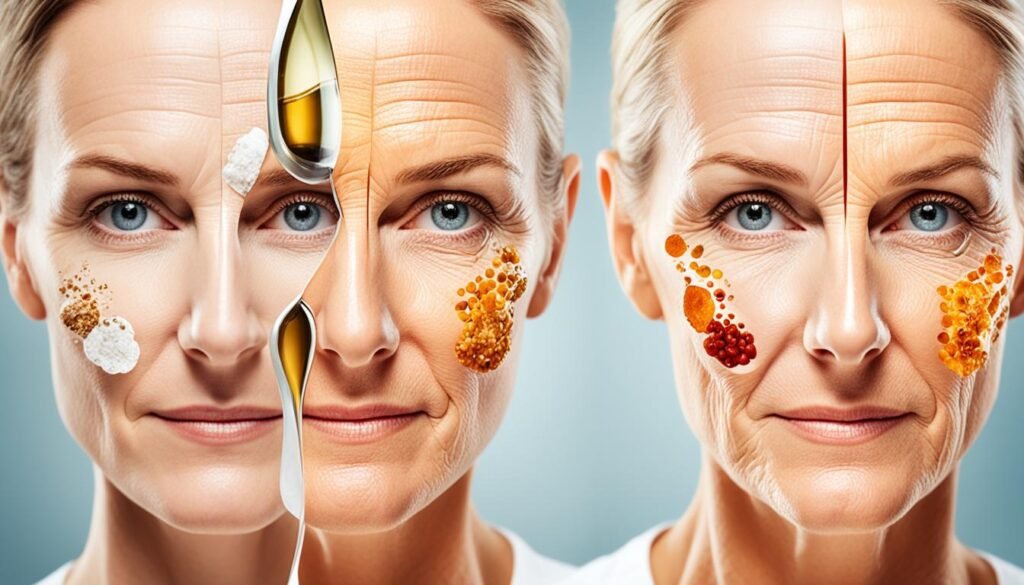
Alcohol consumption can have various effects on the face. Dehydration caused by alcohol can make the skin appear dull and dry. It can also lead to bloating, puffiness, and dark circles under the eyes. Alcohol can cause hormonal imbalances, triggering acne breakouts, and can damage collagen and elastin in the skin, resulting in premature aging with wrinkles, fine lines, and sagging skin. Additionally, alcohol can dilate blood vessels, causing dark circles and puffiness under the eyes to develop.
| Effects of Alcohol on the Face | |
|---|---|
| Dehydration | Dull and dry skin |
| Bloating | Puffiness |
| Dark circles under the eyes | |
| Hormonal imbalances | Acne breakouts |
| Collagen and elastin damage | Premature aging with wrinkles, fine lines, and sagging skin |
| Dilated blood vessels | Dark circles and puffiness under the eyes |
Overcoming Alcohol-Related Skin Issues
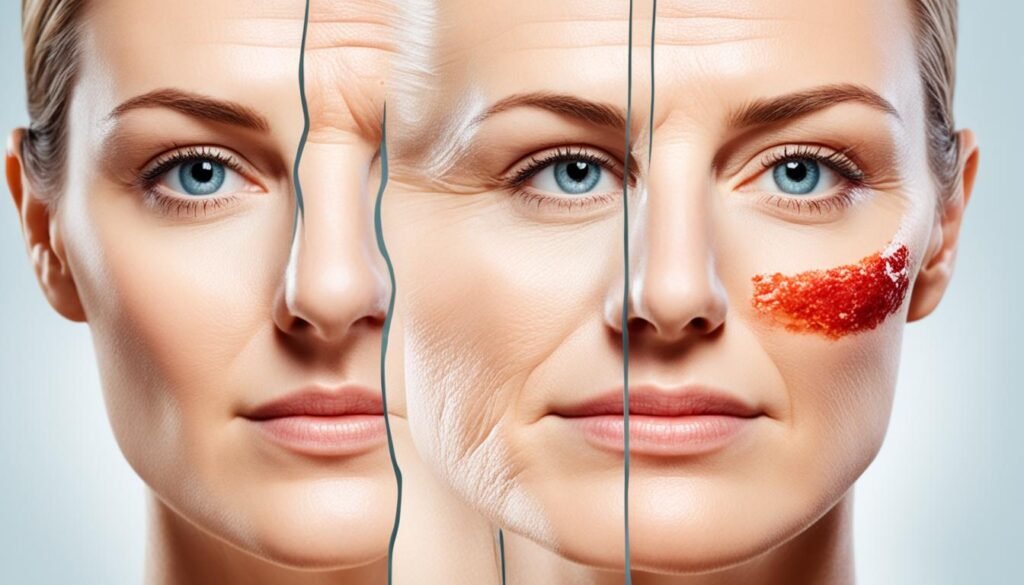
While it may be challenging to reverse the effects of long-term alcohol abuse on the skin, making positive lifestyle changes and seeking appropriate treatment can help. Stopping or reducing alcohol consumption can allow the skin to regenerate to some extent, but the extent of damage may vary depending on the duration and severity of alcohol abuse. Good skincare practices, such as staying hydrated, using moisturizers, and avoiding harsh skincare products, can also provide some relief. Seeking professional help for alcohol abuse through detox and addiction treatment programs can support overall well-being and skin health.
Reversing alcohol-related skin damage requires a comprehensive approach that addresses both the underlying causes and the visible symptoms. By following a targeted alcohol-related skincare routine and seeking alcohol abuse treatment, individuals can take steps towards improving their skin health and overall well-being.
Here are some strategies that can help overcome alcohol-related skin issues:
- Quit or reduce alcohol consumption: Cutting down on or quitting alcohol altogether can give the skin a chance to recover. This lifestyle change can minimize further damage and allow the body to focus on repairing the skin.
- Stay hydrated: Drinking plenty of water can help hydrate the skin from within and counteract the dehydrating effects of alcohol.
- Use moisturizers: Applying moisturizers regularly can help replenish lost moisture and restore the skin’s hydration levels.
- Avoid harsh skincare products: Alcohol-based skincare products can exacerbate skin dryness and irritation. Opt for gentle, alcohol-free formulations that nourish and protect the skin.
- Seek professional help: Getting professional help for alcohol abuse through detox and addiction treatment programs is crucial. These programs can provide the necessary support, guidance, and resources to overcome alcohol addiction and improve overall well-being, including the health of the skin.
By combining these strategies with patience and consistency, individuals can take proactive steps towards reversing alcohol-related skin damage and achieving healthier, clearer, and more vibrant skin.
Personal Testimonial: Treating Alcohol-Related Skin Damage
“After years of struggling with alcohol abuse, I noticed the toll it had taken on my skin. The dehydration, inflammation, and premature aging were impossible to ignore. Determined to recover, I decided to quit drinking and sought professional help through an addiction treatment program. Alongside my sobriety journey, I adopted a comprehensive alcohol-related skincare routine, focusing on hydration, gentle products, and consistency.
Over time, my skin started to show signs of improvement. The dryness diminished, inflammation reduced, and I noticed a renewed radiance. Seeking treatment for alcohol abuse not only turned my life around but also played a vital role in reversing the damage inflicted upon my skin. Today, I am proud to say that my skin reflects my commitment to my well-being, inside and out.”
Emily Davis
| Treatment Strategies | Benefits |
|---|---|
| Quitting or reducing alcohol consumption | Allows the skin to regenerate and heal, minimizes further damage |
| Staying hydrated | Restores moisture from within, counteracts alcohol-induced dehydration |
| Using moisturizers | Replenishes lost moisture, restores hydration levels |
| Avoiding harsh skincare products | Prevents skin dryness and irritation, supports skin healing |
| Seeking professional help | Provides guidance, support, and resources for overcoming alcohol addiction |
*Please note that individual results may vary. It is important to consult with a healthcare professional for personalized advice and treatment options.
Reversing alcohol-related skin damage requires commitment, patience, and a holistic approach. By prioritizing alcohol-related skincare, making positive lifestyle changes, and seeking the necessary support, individuals can reclaim their skin’s health and regain confidence in their appearance.
Conclusion
Excessive alcohol consumption can have detrimental effects on the skin. It causes dehydration, inflammation, and worsens existing skin conditions. Chronic alcohol abuse can lead to more severe skin problems such as infections, skin cancer, and changes related to alcoholic liver disease.
To maintain healthy skin, it is crucial to be mindful of alcohol consumption and practice good skincare habits. Staying hydrated, using moisturizers, and avoiding harsh skincare products can help mitigate alcohol-related skin issues.
Seeking treatment for alcohol abuse is not only important for overall health but also for supporting skin health and well-being. By reducing or quitting alcohol, individuals can give their skin an opportunity to regenerate to some extent. It’s essential to remember that the extent of damage may vary depending on the duration and severity of alcohol abuse. Consulting healthcare professionals and participating in detox and addiction treatment programs can provide the necessary support for a healthier lifestyle and improved skin health.
FAQ
Does alcohol cause skin inflammation and aging?
Yes, excessive alcohol consumption can lead to skin inflammation and aging. Alcohol dehydrates and inflames the skin, causing visible dehydration, wrinkles, under-eye puffiness, and redness. It can also disrupt sleep patterns and aggravate underlying skin conditions like rosacea and eczema. Chronic alcohol abuse may result in more severe skin problems, including increased risk of infections, skin cancer, and skin changes related to alcoholic liver disease.
What are the effects of alcohol on the skin?
Alcohol can have various effects on the skin. It dehydrates the skin, leading to dryness and flakiness. It also impairs the skin’s natural moisture barrier, making it more prone to dryness, redness, and irritation. Alcohol stimulates the release of histamines, causing flushing and inflammation. Additionally, alcohol can exacerbate existing skin conditions like rosacea, eczema, psoriasis, and seborrheic dermatitis.
How does alcohol cause dehydration and skin damage?
Alcohol is a diuretic and can cause dehydration in the body, leading to dry and flaky skin. It reduces oil production by the skin, further contributing to dryness. Alcohol also impairs the skin’s natural barrier function, making it more prone to dryness, redness, and irritation. Drinking plenty of water and using moisturizers regularly can help mitigate alcohol-related skin dehydration.
Does alcohol cause flushing and inflammation of the skin?
Yes, alcohol can cause flushing and inflammation of the skin. Alcohol stimulates the release of histamines, leading to dilated blood vessels and a flushed appearance. Over time, this inflammation can become more prominent and difficult to reverse, resulting in persistent facial redness.
What skin conditions are aggravated by alcohol?
Alcohol abuse can worsen existing skin conditions such as rosacea, eczema, psoriasis, and seborrheic dermatitis. Alcohol-induced flushing can cause irritation and inflammation in individuals with rosacea. Those with existing liver problems are more susceptible to developing discoid eczema. Alcohol consumption may increase the risk and treatment resistance of psoriasis. Excessive alcohol intake can also exacerbate seborrheic dermatitis.
What are the long-term effects of alcohol on the skin?
Heavy and chronic alcohol consumption can have long-term effects on the skin. Excessive alcohol intake weakens the immune system, making individuals more susceptible to skin infections. It may also increase the risk of developing skin cancer by compromising the immune system and exacerbating the effects of UV light on the skin. Alcohol abuse can lead to skin changes related to alcoholic liver disease, such as jaundice, itchy skin, and dry skin.
How does alcohol cause dry skin?
Alcohol consumption can cause dry skin by dehydrating the body. When the body is dehydrated, the skin can become dry, flaky, and lacking moisture. Alcohol also impairs the skin’s natural moisture barrier, making it more prone to drying out and experiencing redness, irritation, and other skin complications. Staying hydrated, using moisturizers, and avoiding harsh skincare products can help maintain the skin’s moisture barrier.
What effects does alcohol have on the face?
Alcohol consumption can have various effects on the face. It can make the skin appear dull and dry due to dehydration. It can also lead to bloating, puffiness, and dark circles under the eyes. Alcohol can cause hormonal imbalances, triggering acne breakouts. Furthermore, alcohol can damage collagen and elastin in the skin, resulting in premature aging with wrinkles, fine lines, and sagging skin. Additionally, alcohol can dilate blood vessels, causing dark circles and puffiness under the eyes to develop.
While it may be challenging to reverse the effects of long-term alcohol abuse on the skin, making positive lifestyle changes and seeking appropriate treatment can help. Stopping or reducing alcohol consumption can allow the skin to regenerate to some extent. Good skincare practices, such as staying hydrated, using moisturizers, and avoiding harsh skincare products, can also provide some relief. Seeking professional help for alcohol abuse through detox and addiction treatment programs can support overall well-being and skin health.
What are the conclusions regarding alcohol and skin health?
Excessive alcohol consumption can have detrimental effects on the skin, causing dehydration, inflammation, and exacerbating existing skin conditions. Chronic alcohol abuse may lead to more severe skin problems and increase the risk of infections, skin cancer, and skin changes related to alcoholic liver disease. It is important to be mindful of alcohol consumption and practice good skincare habits to maintain healthy skin. Seeking treatment for alcohol abuse can not only improve overall health but also support skin health and well-being.

